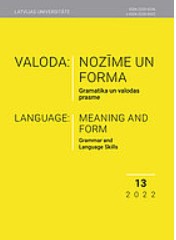Valodas loma lībiešu pēcteču identitātē un valodas nodošana nākamajām paaudzēm
Role of language in the identity of descendants of Livonians and language transmission
Author(s): Gunta KļavaSubject(s): Sociolinguistics, Baltic Languages, Identity of Collectives
Published by: Latvijas Universitātes Akadēmiskais apgāds
Keywords: endangered languages; ethnolinguistic vitality; language attitudes; Livonian; language and identity; language transmission;
Summary/Abstract: The article presents some of the findings of a study of Livonian language skills and their role in the modern Livonian community, focusing on language as one of the important components of individual and community identity. The data were obtained in two stages – by conducting a survey of representatives of the Livonian community and interviews with Livonian language speakers, supplementing the data set with direct observations at various community activities. In the context of endangered languages, awareness of the role of language within the community underpins opportunities and hopes to preserve or restore language (Austin, Sallabank 2011). The study explores the components of linguistic attitudes and the factors that influence it, confirming theoretical approaches to the changeability of linguistic attitudes according to complex developments at both the individual and societal levels, and its relationship with linguistic behaviour. The research data also reveal variations in the roles and possible functions of the Livonian language, which mark the possible directions of language development. It also marks a shift in understanding of the issue of language coexistence within the study’s target group and society as a whole, for example, in the stigmatization of endangered languages and other smaller language collectives, where both scientific and societal perceptions have changed in recent decades, emphasizing the importance of each language to humanity and the understanding of man as a multilingual being (Sallabank 2013). The results of the research trigger a discussion about the processes of linguistic inheritance and language use in today’s critically endangered language communities. In the case of the Livonian language, the main role in the transmission and use of the language is not played by the family, which is still the most important facilitator of motivation and support, but by other language users and learners in different groups of language users, which also marks changes in approach and tasks, planning events and resources for language revitalization and use.
Journal: Valoda: nozīme un forma
- Issue Year: 2022
- Issue No: 13
- Page Range: 124-138
- Page Count: 15
- Language: Latvian

